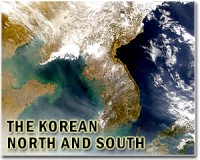 |
Washington (AFP) Nov 25, 2010 President Barack Obama faces precious few appealing choices in handling North Korea's latest armed attack on the South. "This is the land of lousy options... You can choose between bad, worse and the worst," former diplomat Victor Cha told a group of fellow analysts. After this week's deadly artillery attack on a South Korean island, the United States faces three options: resume negotiations with North Korea, which would be seen as rewarding its latest provocation; ease up on the tone of the response and perhaps risk a new shocker from Pyongyang; or toughen its stance and face the prospect of an armed escalation on the Korean peninsula. Obama was briefed several times Wednesday on the developing situation in the Korean peninsula and his administration is working around the clock on the issue, the White House told AFP. During his 2008 election campaign, Obama was more conciliatory than his Republican rival John McCain in vowing a more open policy toward Pyongyang. A few months after he took office, however, he changed his tune after North Korea tested a missile and broke off six-party talks with China, Japan, Russia, the United States and South Korea. Washington has since refused to negotiate directly with Pyongyang until it resumes its participation in the six-party talks. Cha, who served in the White House under Obama's predecessor George W. Bush from 2004 to 2007, said previous US administrations faced the same dilemma with North Korea. He advised resuming negotiations one more time, and hope for the best. Two other Bush-era diplomats disagree, saying that resuming negotiations would be "a colossal mistake." After a long history of failed US policy toward Pyongyang since the 1990s, "the focus right now should be on containment, interdiction and pressure," Michael Green and William Tobey wrote in The Wall Street Journal. Christopher Hill, a top US negotiator on North Korean policy from 2005 to 2009, said "options are never very good when one considers this issue." The former US ambassador opposes direct negotiations with Pyongyang, which would "marginalize" US ally South Korea and "let the Chinese off the hook," when he believes they hold the key to the crisis. Speaking an interview with AFP, Hill said Beijing's cautious approach toward North Korea stems from internal strife between supporters of China's traditional and unconditional support for its neighbor and other sectors concerned with the direction North Korea is taking. "The more we pressure the Chinese, the better," he added. The US State Department took a step in that direction on Wednesday when it called on China to be as clear as the United States in its reaction to the attack, and use its "influence to reduce tensions." "Staying close to South Korea is rule number one," he stressed. "We don't want to be perceived as underreacting to their problem, but we also don't want to be perceived as not worrying about their concern about conflict."
Share This Article With Planet Earth
Related Links Learn about nuclear weapons doctrine and defense at SpaceWar.com Learn about missile defense at SpaceWar.com All about missiles at SpaceWar.com Learn about the Superpowers of the 21st Century at SpaceWar.com
 Obama vows 'unshakeable' support for S.Korea after attack
Obama vows 'unshakeable' support for S.Korea after attackWashington (AFP) Nov 24, 2010 US President Barack Obama described North Korea as a pressing threat and pledged "unshakeable" support for South Korea after the communist state rained a deadly artillery barrage on a border island. Washington and Seoul agreed to "coordinate" any response to North Korea after Tuesday's attack, which killed two South Korean marines and sent panicked civilians fleeing the flashpoint Yellow Sea ... read more |
|
| The content herein, unless otherwise known to be public domain, are Copyright 1995-2010 - SpaceDaily. AFP and UPI Wire Stories are copyright Agence France-Presse and United Press International. ESA Portal Reports are copyright European Space Agency. All NASA sourced material is public domain. Additional copyrights may apply in whole or part to other bona fide parties. Advertising does not imply endorsement,agreement or approval of any opinions, statements or information provided by SpaceDaily on any Web page published or hosted by SpaceDaily. Privacy Statement |